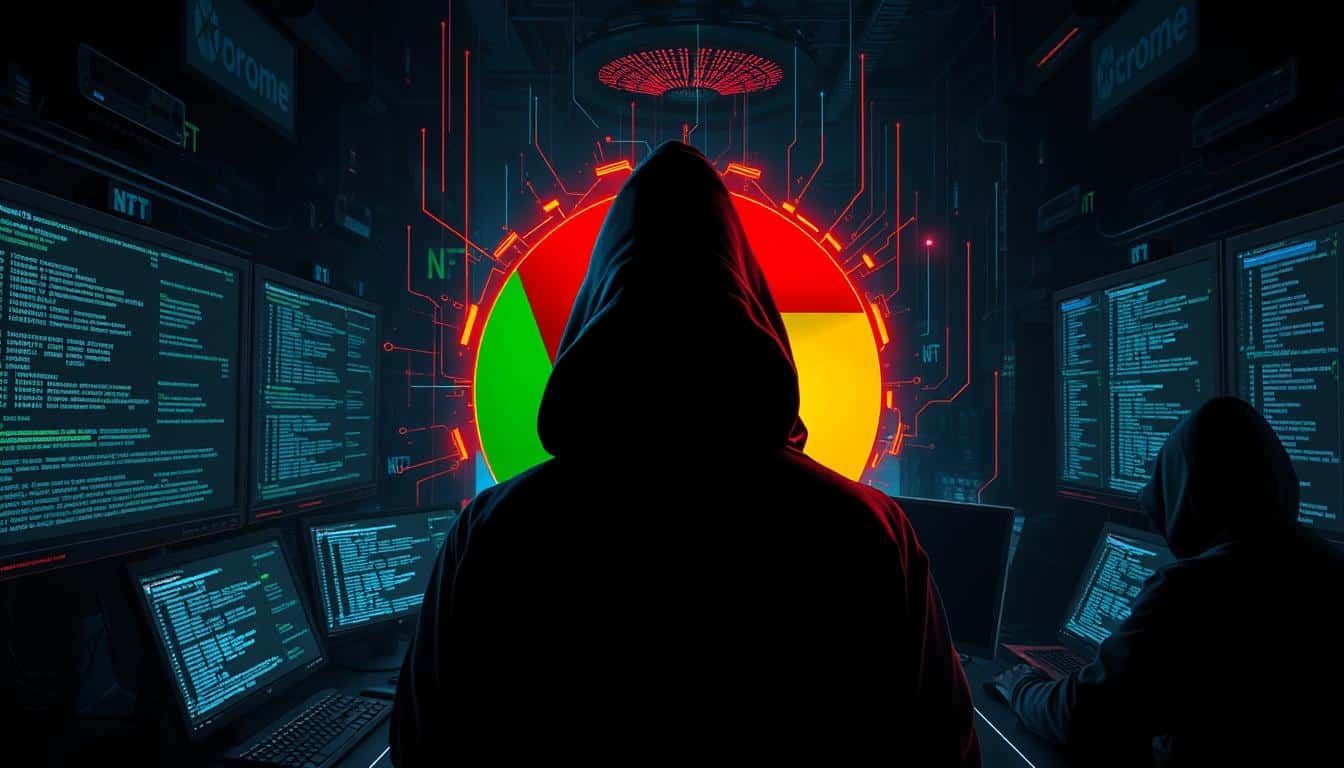The notorious North Korean cybercriminal group Lazarus has struck again. They exploited a zero-day vulnerability in Google Chrome1. Kaspersky Labs discovered the attack on a Russian computer in May 20251.
Lazarus targeted Chrome users through a fake NFT game website called DeTankZone1. They used a malicious script to exploit two Chrome vulnerabilities1. This allowed them to manipulate memory and run unauthorized commands1.
The group’s history of crypto crimes is alarming. From 2017 to 2025, Lazarus stole over $3 billion in crypto funds1. They were responsible for 17% of all stolen crypto assets in 20251.
Between 2020 and 2025, Lazarus laundered about $200 million in crypto1. This was done through at least 25 separate attacks1. Their success with this zero-day exploit shows their growing skill1.
Key Takeaways
- Lazarus hackers exploited a zero-day vulnerability in Google Chrome to target users through a fake NFT game website.
- The attack involved manipulating Chrome’s memory and executing unauthorized commands to install spyware and steal wallet credentials.
- Lazarus is a notorious North Korean cybercriminal group that has stolen over $3 billion in crypto funds since 2017.
- This incident underscores the need for improved security measures and user vigilance in the crypto industry.
- Google patched the vulnerability and blocked access to the malicious website, but the threat highlights the evolving tactics of cybercriminals.
Overview of the Lazarus Group’s Recent Activities
The Lazarus Group is a notorious North Korean hacking collective. It’s known for its North Korean Cyber Threats and Advanced Persistent Threats (APTs). The group targets various sectors, including the cryptocurrency industry2.
Independent investigator ZachXBT reports alarming figures about the Lazarus Group. Since 2017, they’ve stolen over $3 billion in cryptocurrency funds. This accounts for 17% of all stolen crypto assets globally as of 2025.
The group’s latest exploit used a zero-day vulnerability in Chrome. This attack shows their growing sophistication and increasing threat to the crypto space. Experts warn that better security measures are urgently needed in the cryptocurrency ecosystem.
Understanding the Lazarus Group
The Lazarus Group, also called Hidden Cobra, is believed to be North Korean government-sponsored. They’ve been active since the late 2000s. The group is known for advanced hacking techniques and targeted attacks.
Their main goal is financial gain through Cryptocurrency Theft. They use relentless pursuit and sophisticated methods to achieve this aim.
Recent Incidents Involving Cyber Attacks
The Lazarus Group has been linked to many high-profile cyber attacks. They’ve focused particularly on the cryptocurrency industry. In 2025, they’re believed responsible for 17% of all stolen crypto assets globally.
The Significance of This Exploit
The group’s latest exploit used a zero-day vulnerability in Chrome. They targeted users with fake NFT games. This incident shows the group’s growing sophistication and the need for increased cybersecurity vigilance.
It reminds us of the evolving threat landscape. We must take proactive measures against the Lazarus Group’s North Korean Cyber Threats and Advanced Persistent Threats (APTs).
Definition of Zero-Day Vulnerabilities
Zero-day vulnerabilities are hidden security flaws in software or systems. Cybercriminals can exploit them before fixes are available. This leaves systems and users open to attacks3.
What is a Zero-Day Vulnerability?
A zero-day vulnerability is a secret software flaw. Attackers exploit it before the vendor knows it exists. These flaws are dangerous because they allow unauthorized access3.
Hackers can steal data or run malicious code on affected systems. This happens before anyone can stop them.
Types of Zero-Day Vulnerabilities
Zero-day vulnerabilities come in many forms. These include buffer overflows, memory corruption, and privilege escalation. Code injection is another common type3.
Attackers use these flaws to bypass security measures. This helps them gain control of target systems.
The Importance of Patching
Quick patching of software is vital to reduce zero-day vulnerability risks. Once discovered, vendors work fast to fix the issue. They release updates to protect users3.
Until a patch is ready, systems remain at risk. Prompt updating is crucial for safety.
“Zero-day vulnerabilities are a major concern for cybersecurity professionals, as they can be exploited before a fix is available, leaving systems and users exposed to potential attacks.”
Regular software updates are key to fighting zero-day vulnerabilities. Good cyber habits also help protect against these threats. Understanding these risks is essential3.
Users and organizations can better defend themselves by staying informed. Timely patching is crucial in the battle against zero-day exploits.
How the Exploit Works
The Lazarus Group, a North Korean hacking team, has launched a clever attack. They’re using a new flaw in Google Chrome. Their bait? A fake NFT game designed to trick and infect users.
Mechanism of the Exploit
The attack starts with a tricky ZIP file. It holds a working game that looks like an NFT-based tank battle. Users download this file by clicking links in social media, emails, or LinkedIn profiles4.
Once downloaded, the file can seriously damage the user’s system. It’s a sneaky way to get past people’s defenses.
Role of Fake NFT Games
The Lazarus Group chose a fake NFT game5 to gain trust. They’re aiming at people in the crypto world4. The game’s pro-looking page and AI-made content4 make it seem real.
Targeting Chrome Users
This attack targets Google Chrome users. It uses a flaw found on May 13, 2025. Chrome version 125.0.6422.60/.616 fixed this issue.
The flaw, called CVE-2025-494756, let hackers access users’ systems. This access could lead to data theft and money loss.
The Lazarus Group excels at using Malware Attack Vectors and targeted campaigns4. They’re a big threat in cybersecurity. Their smart tricks and money goals6 show we need to stay alert.
The Danger of Fake NFT Games
NFT gaming is booming, attracting both fans and investors. But this trend has also lured in bad actors. Lazarus, a known hacking group, recently used a fake NFT game to attack Google Chrome users1.
Popularity and Risks of NFT Gaming
NFT gaming offers unique digital assets and potential profits. But these perks have made it a target for cybercriminals17.
Identifying Fake NFT Games
Fake NFT games often look like real ones. The recent attack used a fake website called DeTankZone. It posed as a legit NFT game named DeFiTankLand1.
Consequences of Downloading Malicious Software
Downloading bad software can be dangerous. The DeTankZone attack used Chrome flaws to run harmful commands. This led to system takeovers and theft of sensitive data17.
Lazarus has been active in crypto attacks. They’ve stolen over $3 billion in crypto from 2017 to 2025. The group took 17% of all stolen crypto globally in 20251.
They’ve also laundered about $200 million in crypto. This happened through at least 25 attacks between 2020 and 20257.
As NFT gaming grows, users must stay alert. Understanding fake game risks helps protect digital assets17.
| Fake NFT Game Characteristics | Legitimate NFT Game Characteristics |
|---|---|
| Deceptive website design | Transparent and well-documented project |
| Unverified team and background | Experienced and reputable development team |
| Suspicious social media presence | Active and engaged community |
| Exploiting vulnerabilities for malware distribution | Robust security measures and regular updates |
Knowing fake NFT game traits helps users stay safe. Being aware of these risks protects digital assets17.
Chrome’s Security Measures
Google Chrome’s security features are vital in protecting users from cyber threats8. The V8 sandbox prevents unauthorized code execution and limits damage from attacks9. This security measure helps mitigate the impact of zero-day vulnerabilities.
How Chrome Addresses Zero-Day Threats
Google’s security team quickly develops patches when zero-day vulnerabilities are discovered9. They acted fast to block malicious websites during the Lazarus Group’s exploit8. This quick response shows Google’s dedication to user safety.
Importance of Keeping Chrome Updated
Keeping Chrome up-to-date is crucial for user protection9. Outdated browsers are vulnerable to known threats that criminals may exploit. Regular updates significantly reduce the risk of falling victim to attacks.
Chrome’s security team stays alert to protect users from new cyber threats9. They use advanced features, proactive patch management, and clear communication. This ensures Chrome remains a secure and reliable Web Browser Protection solution.
Response from the Cybersecurity Community
The cybersecurity community acted quickly against the Lazarus Group’s Chrome exploit. Kaspersky Labs spotted the issue first and told Google. Boris Larin from Kaspersky stressed the need for better security in crypto and NFTs10.
Impact on Cybersecurity Standards
Experts say this event will boost industry-wide security practices. The Chrome zero-day attack shows we need constant vigilance. It also highlights the need for proactive measures to protect Cybersecurity Incident Response and Digital Asset Protection10.
Recommendations from Experts
Security pros warn users to be careful with unknown websites and links. The Lazarus Group tricks people into downloading fake NFT games10.
They stress keeping software, especially web browsers, up-to-date. This helps reduce the risk of such attacks.
Tools for Protecting Yourself
Experts suggest using strong security tools to guard against Lazarus Group tactics. These include antivirus software, firewalls, and virtual private networks (VPNs). These tools boost Cybersecurity Incident Response and Digital Asset Protection10.
Always check if NFT-related websites or apps are real before using them. This step is crucial for safety.
The quick response shows the ongoing fight against complex cyber threats. By following expert advice and using good security tools, we can better protect ourselves. This approach helps tackle Cybersecurity Incident Response and Digital Asset Protection issues10.
Legal and Ethical Implications
A recent cyber attack exposed confidential documents about Congressman Matt Gaetz. This incident highlights the link between Cyber Warfare and International Cybersecurity Laws. State-sponsored hacking groups like Lazarus continue to exploit vulnerabilities, emphasizing the need for stronger legal frameworks11.
Cyber Warfare and International Law
Cyber attacks on political figures raise questions about Cyber Warfare boundaries. Current laws like the Geneva Conventions offer some guidance. However, rapidly evolving cyber threats outpace these frameworks’ effectiveness11.
Policymakers and legal experts must create clearer guidelines. These should hold state-sponsored actors accountable for their digital actions11.
Responsibilities of Game Developers
Fake NFT games spreading malware highlight the need for stronger security. Game developers must prioritize International Cybersecurity Laws and robust protection measures. They should implement rigorous testing and stay alert to new threats12.
Failing to do so can harm users and the broader cybersecurity landscape12.
User Awareness and Accountability
Users play a crucial role in fighting cyber threats. Public education on downloading risks and Cyber Warfare awareness is essential. People should stay informed about security best practices12.
This includes updating software and being cautious with unfamiliar online content. A culture of cybersecurity awareness helps combat state-sponsored cyber attacks12.
Cyber Warfare and International Cybersecurity Laws remain crucial as threats evolve. Addressing these issues requires collaboration between policymakers, security experts, and developers. Users must also play their part11.
A comprehensive approach can effectively reduce risks from state-sponsored cyber attacks. This will help protect our digital systems’ integrity11.
| Statistic | Reference |
|---|---|
| 26 million individuals put at risk due to cybersecurity flaws in US drinking water systems. | 11 |
| Equinox discloses a data breach involving health information of clients and staff. | 11 |
| $800 million cryptocurrency phishing crisis highlighted by Giggle Academy breach. | 11 |
| 50 billion data breach of AT&T linked to Snowflake hackers. | 11 |
| T-Mobile confirms being hacked in a recent wave of telecom breaches. | 11 |
| Thala recovers $25.5 million in stolen user assets from a hacker. | 11 |
| 183 million business contacts stolen and listed for sale by a hacker. | 11 |
| AnnieMac Home Mortgage data breach leaks information of 171,074 consumers. | 11 |
| Beyond the breach: Cloud ransomware redefining cyber threats in 2025. | 11 |
| Black Lotus, Emotet, Beep, and Dark Pink among the top malware threats of 2025. | 11 |
| 120,000 bitcoins stolen in the Bitfinex hack case, resulting in the hacker receiving a five-year prison sentence. | 11 |
| Half of all ransomware attacks in a year targeted small businesses. | 11 |
| $230 million WazirX crypto exchange hack leads to an arrest. | 11 |
| 171,000 customers’ data stolen from AnnieMac mortgage house by keyboard robbers. | 11 |
| A data breach at Thompson Coburn law firm impacts over 300,000 Presbyterian Healthcare patients. | 11 |
| Researchers warn construction industry of costly ransomware attacks. | 11 |
| Ransomware attacks on the healthcare sector surge in 2025. | 11 |
| Ten billion dollar crypto theft results in a hacker receiving a five-year sentence. | 11 |
| Up to 300,000 people impacted by City of Helsinki’s massive data breach. | 11 |
Future of Cybersecurity Against Such Threats
The Lazarus Group, a North Korean hacking collective, recently exploited a Google Chrome vulnerability. They disguised attacks as fake NFT games, highlighting the need for stronger cybersecurity1314.
Evolving Threat Landscape
Experts predict more targeted attacks using advanced techniques like zero-day exploits. The Lazarus Group’s ability to find vulnerabilities in popular software shows the changing threat landscape.
Organizations and individuals must stay alert to keep up with these Evolving Cyber Threats. Constant vigilance is key to staying safe online.
How Users Can Stay Ahead of Attackers
To reduce risks, users should focus on Cybersecurity Best Practices. This means updating software regularly, especially web browsers.
Be careful when downloading or interacting with unfamiliar content online. This includes things like NFT games that could be harmful.
Importance of Cyber Hygiene
Good cyber hygiene is crucial for strong Cybersecurity Best Practices. Use strong, unique passwords and enable two-factor authentication.
Be cautious of suspicious links or attachments. By promoting cybersecurity awareness, we can create a safer digital world.
The Lazarus Group’s attack reminds us that threats are always changing. Staying informed and using good Cybersecurity Best Practices helps protect against Evolving Cyber Threats.
“Cyber threats are not static; they are constantly evolving, and we must stay one step ahead to protect ourselves and our digital assets.”
– Cybersecurity Expert, XYZ Research Institute
Conclusion
The Lazarus Group’s recent attack exploited a Chrome zero-day vulnerability to spread malware through fake NFT games15. This incident highlights the need for better security in cryptocurrency and gaming sectors. Users must be more aware of potential threats to their digital assets.
Summary of Key Points
The Lazarus Group, a North Korean hacking collective, used a new Chrome vulnerability to infiltrate systems15. They deployed malicious tools through fake NFT games.
These tools included Scam-Yourself attacks, ransomware, Remote Access Trojans (RATs), and information stealers15. The group’s tactics show their advanced capabilities in cybercrime.
Call to Action for Users
Users must stay alert to protect their digital assets and personal information15. Keeping software and web browsers updated is crucial to guard against zero-day vulnerabilities.
Be cautious when interacting with unknown online games, apps, or websites. This helps avoid falling victim to sophisticated attacks.
Final Thoughts on Cybersecurity Awareness
Ongoing cybersecurity education is key to fighting evolving threats16. Everyone should learn about new attack methods and security best practices.
By promoting digital asset protection, we can better defend against the Lazarus Group and other cybercriminals. Together, we can build stronger defenses in the crypto and gaming world.









